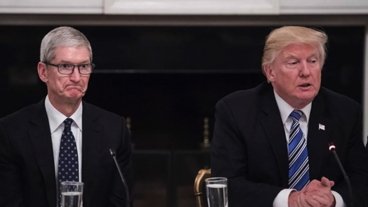The European Union has fined Facebook 110 million euros — about $122 million — for providing "misleading information" during a 2014 review of its WhatsApp acquisition, which raised concerns about data sharing between the two services.
The European Commission won't undo the acquisition because "the incorrect or misleading information provided by Facebook did not have an impact on the outcome of the clearance decision," according to a statement shared with Bloomberg on Thursday. In a speech in Bucharest, Competition Commissioner Margrethe Vestager added that Facebook managed a lower fine because it had cooperated with officials.
During the 2014 review, Facebook told the E.U. that it couldn't perform "reliable automated matching between the two companies' user accounts." In August 2016 however it started doing exactly that, drawing the Commission's attention. The Commission forced Facebook to stop processing user data during the investigation, and the U.K. instituted a similar policy within its own borders. In the U.S., the Federal Trade Commission has received complaints from privacy advocates that Facebook broke the law.
On Thursday, Facebook said that it had "acted in good faith" in 2014, and that mistakes it made "were not intentional." It also won't appeal the fine.
The E.U.'s primary concern during the review wasn't privacy, but whether Facebook would be able to consolidate its position in online advertising. It ultimately found no issues, determining for example that WhatsApp data wouldn't be useful to advertisers, and that it wouldn't increase the data available to Facebook's own ad services.
WhatsApp is an extremely popular online messaging platform, and despite some government worries about too little privacy, has also been targeted by the governments for instituting too much. The service uses end-to-end encryption, which police and spy agencies have complained makes it possible for terrorists and other criminals to hide their communications.
 Roger Fingas
Roger Fingas








 Oliver Haslam
Oliver Haslam
 William Gallagher
William Gallagher
 Christine McKee
Christine McKee
 Sponsored Content
Sponsored Content

 Malcolm Owen
Malcolm Owen
 Andrew Orr
Andrew Orr









3 Comments
While I appreciate the ruling in general, what almost every times annoys me is the fact that the actual punishment rarely exceeds a disapproving slap one the wrist. Or is anyone here if the opinion that the actual amount is actually hurting FB?
The fine guidelines are in this .Pdf
http://ec.europa.eu/competition/cartels/overview/factsheet_fines_en.pdf
They are calculated as deterrents.
In this case Facebook collaborated, which no doubt helped them but if they get caught again for something similar, the fine will take the repetitive action into account.
Apple stockholders would have been better off if Tim Cook had made a deal with Margrethe Vestager. The lady is not for turning.